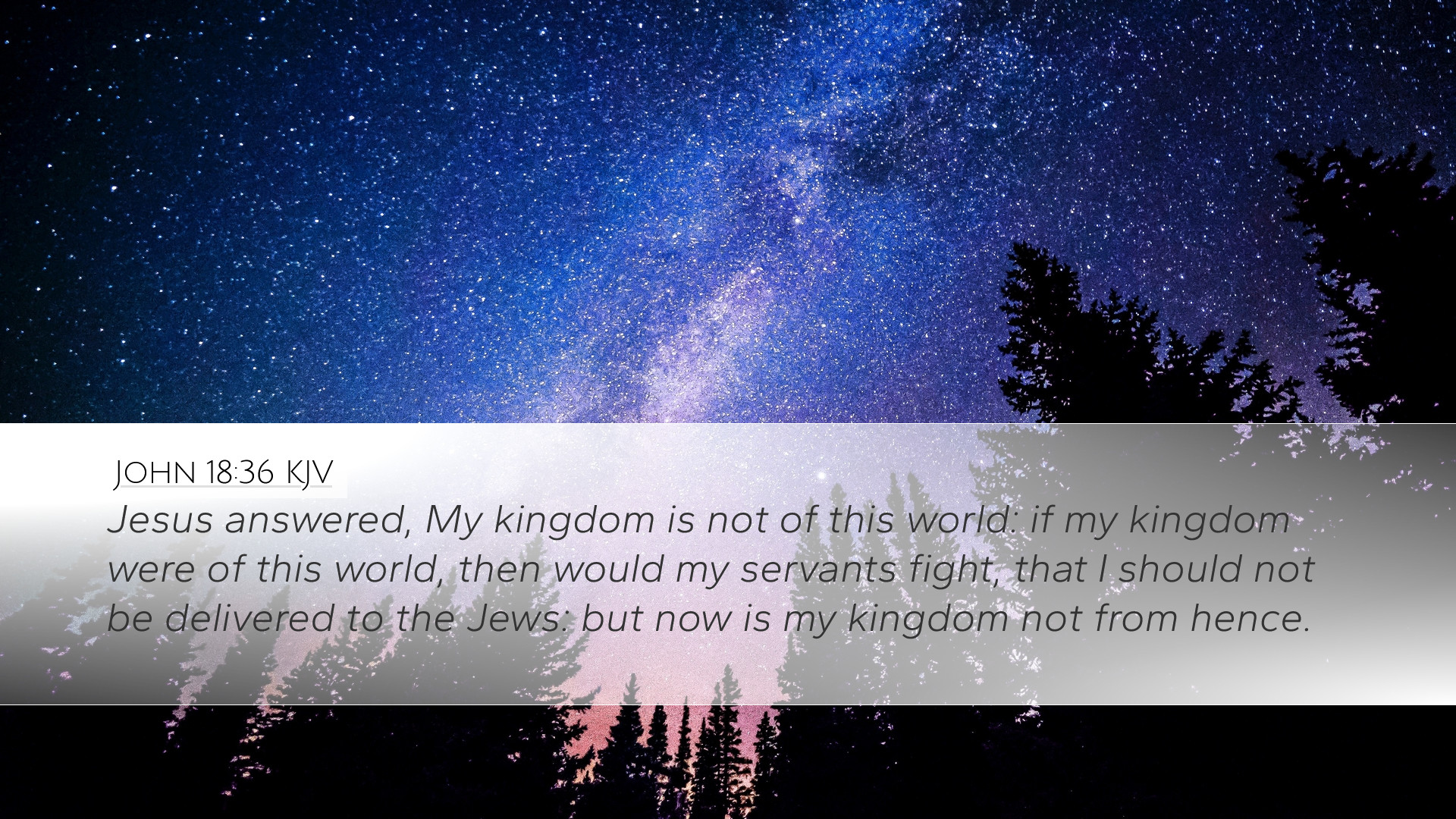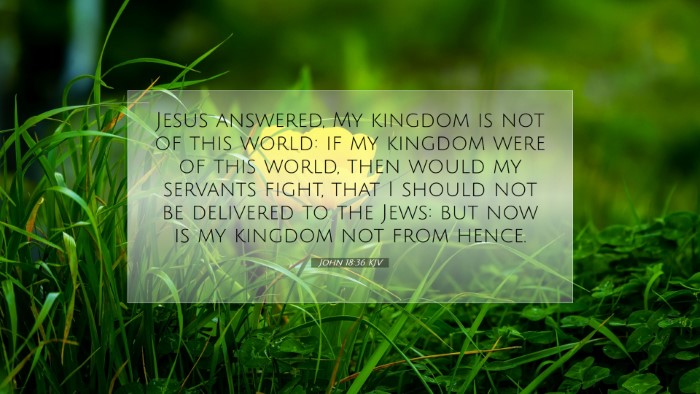Commentary on John 18:36
John 18:36 states, "Jesus answered, My kingdom is not of this world: if my kingdom were of this world, then would my servants fight, that I should not be delivered to the Jews: but now is my kingdom not from hence." This verse captures a pivotal moment in the trial of Jesus before Pilate, highlighting profound theological truths about Christ's kingship and the nature of His kingdom.
Contextual Background
To understand this declaration, we must consider the circumstances surrounding it. Jesus has been arrested and brought before Pontius Pilate, the Roman governor. The accusations against Him involve claims of blasphemy and sedition. Thus, the discourse here serves to clarify to Pilate—and by extension, to us—the nature of Jesus' authority and mission.
The Nature of Christ's Kingdom
The phrase "My kingdom is not of this world" emphasizes the spiritual rather than political or earthly nature of Jesus' reign. According to Matthew Henry, this declaration signifies that Jesus’ kingdom does not rely on earthly powers or military force. Instead, it is established upon truth, grace, and divine authority.
Albert Barnes further elaborates, stating that the essence of Christ's kingdom is transformative, existing within the hearts of believers rather than being manifested through forceful dominion or political might. This kingdom embodies righteousness, peace, and joy within the Holy Spirit, a concept echoed in Romans 14:17.
Implications for Believers
For pastors and theologians, understanding the implications of this kingdom is crucial. Adam Clarke notes the necessity for followers of Christ to recognize their role as servants to this divine kingdom. If the kingdom were of this world, they would resort to worldly measures for its defense. However, the essence of discipleship calls for faithfulness instead of rebellion, reflecting the character of Christ Himself.
- Kingdom’s Origin: The source of Christ’s authority arises from the divine, underscoring that it is not a product of human ambition or structure.
- Followers’ Role: Believers are summoned to accompany Christ in servitude and humility, reflecting His values in their living.
- Resistance to Evil: Engaging in spiritual warfare rather than physical confrontations is paramount in advancing the kingdom of God.
Contrast with Worldly Kingdoms
By declaring that His kingdom is not of this world, Jesus establishes a clear contrast with the political systems and power structures of His time—and indeed, throughout history. Matthew Henry notes that while worldly kingdoms often seek expansion through conflict and exertion of power, Christ's reign advances through love, sacrifice, and the transformative power of the Gospel.
Albert Barnes expands on this by illustrating that all human authority is transient and ultimately subordinate to God’s eternal reign. This acknowledgement invites believers to anchor their hope not in earthly rulers or their decrees, but in the unshakeable kingdom of Christ.
Theological Reflections
The theological implications are immense for religious leaders and scholars. Jesus embodies a new paradigm of kingship, one that challenges the status quo. The idea that His servants would not fight suggests a radical confrontation of societal norms regarding power and authority. Adam Clarke emphasizes that the true fight for believers lies in the realm of spiritual realities—against sin, injustice, and oppression—rather than against flesh and blood.
Living Out the Kingdom's Reality
In response to Christ's assertion, there is an active call for believers today to reflect this kingdom reality in their lives. They are to engage with the world not through force but through the demonstration of the love and truth of God. This leads to authentic transformation, both personally and corporately.
Practices That Reflect the Kingdom
- Prayer: Engaging in earnest prayer for God’s will to be done on earth as it is in heaven.
- Service: Serving one's neighbor and standing against injustice as expressions of Christ’s kingdom.
- Witness: Sharing the Gospel in love, proclaiming the lordship of Christ in all aspects of life.
Conclusion
John 18:36 is a powerful testament to the nature of Christ's reign as distinctly separate from earthly kingdoms. As believers reflect on this truth, they are reminded of their calling to live as ambassadors for this kingdom. They are tasked with not just proclaiming His reign but embodying it in their daily lives, showcasing a resolve to seek peace, justice, and the extension of grace to all. This commentary aims to equip pastors, students, theologians, and Bible scholars with a robust understanding of the implications of Christ's kingly authority and the transformative power of His message.


